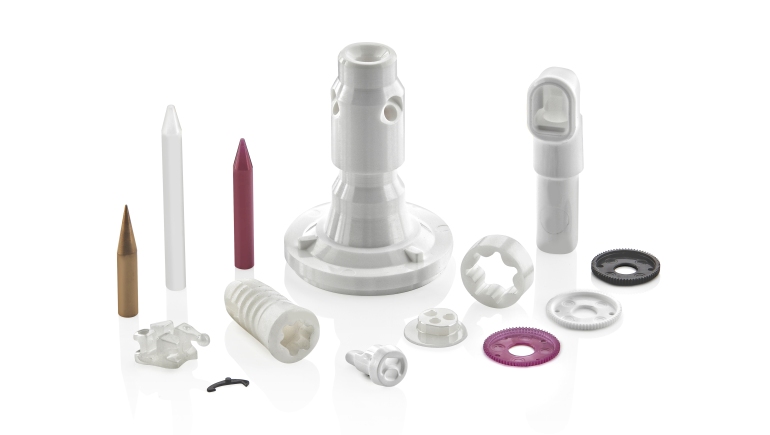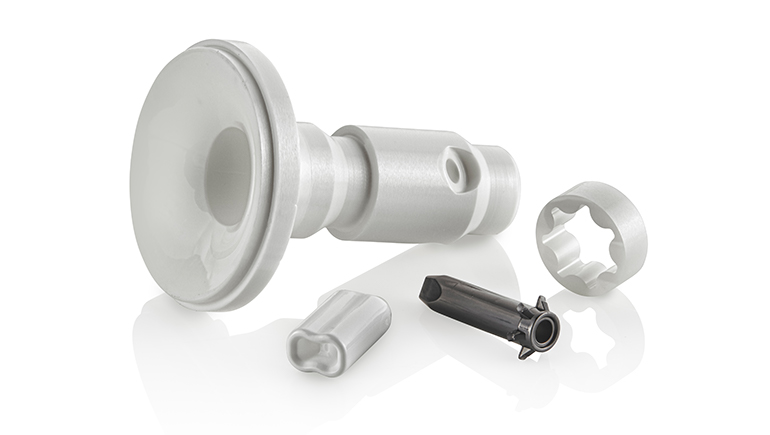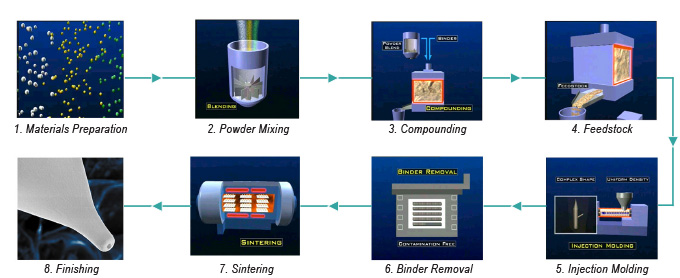Keramikspritzguss
Ihr Bedürfnis ist unsere Herausforderung. Schliesslich ist SPT Technologieführer in der Entwicklung und Herstellung technischer, kundenspezifischer und hochpräziser Keramikteile im Keramik-Spritzgussverfahren (CIM)
Wir sind spezialisiert auf Keramik-Spritzguss (CIM) von kleinen komplexen & präzisen Komponenten mit µ-Toleranzen. Dabei verarbeiten wir Materialien wie Aluminiumoxid, Zirkoniumdioxid, zirkoniumdioxid-gehärtetes Aluminiumoxid und polykristallinen Rubin und richten uns strikt nach ihren Designvorgaben.
Anwendungsbeispiele:
- Düsen mit Lochdurchmesser ≥ 15µm und Toleranzen ≥ 1µm
- Medizinische Werkzeuge & Implantate
- Zahnmedizinische Anwendungen
- Industrielle und elektronische Komponenten
Der Keramikspritzguss Prozess
Durch das CIM-Verfahren werden mittels Spritzguss- und Sintertechniken mit sehr harten Werkstoffen komplexe Teile hergestellt, die mit herkömmlichen Methoden zu schwierig, zu teuer oder gar unmöglich zu produzieren wären. Das Keramikspritzgussverfahren kann auch dazu verwendet werden, Bauteile zu verbinden, die bisher aufwendig nachträglich montiert werden mussten.
Das Keramikspritzgiessen ermöglicht die wirtschaftliche Herstellung von hochpräzisen Kleinteilen mit maximaler Gestaltungsfreiheit in Bezug auf Geometrie und Materialeigenschaften und gesicherter Reproduzierbarkeit. Jedes massgeschneiderte, hochpräzise Keramikteil hat individuelle Eigenschaften und Anforderungen. Als weltweit führender Hersteller von kundenspezifischen, hochpräzisen Keramikteilen arbeiten unsere hoch qualifizierten Mitarbeiter während des gesamten Planungs- und Entwicklungsprozesses mit Ihnen zusammen. So optimieren wir gemeinsam das Endprodukt und die Produktionskette in bestmöglicher Weise.
Keramische Teile für medizinische und dentale Anwendungen
SPT fertigt Präzisionsteile aus technischer Keramik für die Dental- und Medizinindustrie
Hochpräzise keramische Uhren- und Industrieteile
Anwendungsbeispiele für verschiedene Branchen
Durch seine maximale Gestaltungsfreiheit eröffnet der CIM Prozess verschiedensten Industrien den Zugang zu den Vorteilen des Hochleistungswerkstoffs Keramik.
High End Keramik Düsen
SPT ist spezialisiert auf die Herstellung von keramischen Präzisionsdüsen
Das CIM-Verfahren ermöglicht die wirtschaftliche Herstellung von keramischen Hochpräzisionsdüsen. Bohrungen mit Toleranzen von 1 Mikrometer sind unser tägliches Geschäft.
Mit einer weitgefassten Definition kann man alle anorganischen, nichtmetallischen Werkstoffe als Keramik bezeichnen. Mit anderen Worten: Alles, was nicht den Kunststoffen oder Metallen zugeordnet werden kann, gilt als Keramik
Hochleistungskeramik verfügt über sehr positive mechanische Eigenschaften wie, eine hohe Dichte, eine grosse Härte und sie ist äusserst resistent gegen Abnutzungserscheinungen.
Die Bruchfestigkeit ist eine Charakteristik, deren Risiko designtechnisch gut kontrolliert werden kann.
Die reduzierte Bruchfestigkeit ist eine Charakteristik, deren Risiken designtechnisch gut kontrolliert werden können.
SPT verfügt über jahrzehntelange Erfahrung auf dem Gebiet der technischen Keramik
Technische Keramik ist heute in vielen Industriezweigen hinsichtlich Leistung, Haltbarkeit und Ästhetik zu einem Trendmaterial geworden. Die Eigenschaften der meisten Keramik-Spritzgussmaterialien sind ideal für eine Vielzahl von Anwendungen.
Auf Anfrage können unsere Materialien nach internationalen ISO- oder ASTM-Normen qualifiziert werden.

1. Zirkonia
2. Alumina
Warum Keramikspritzguss?
Viele Vorteile hat der CIM-Prozess (Ceramic Injection Molding) im Vergleich zu anderen Fertigungsprozessen in wirtschaftlicher und technischer Hinsicht
Die Feinkeramik liefert heutzutage erstklassige Lösungen für technisch schwierige Herausforderungen mit herausragenden Ergebnissen, die herkömmliche Werkstoffe in den Schatten stellen. Dank der Reproduzierbarkeit unserer Fertigungsprozesse können diese vielseitigen Werkstoffe auf wirtschaftliche Weise in vielfältigen Formen und Mengen hergestellt werden.
Ein weiteres starkes Argument in wirtschaftlicher Hinsicht sind die relativ niedrigen Kosten bei grösseren Stückzahlen, vor allem dank der anzustrebenden Net Shape Produktionsstrategie.










